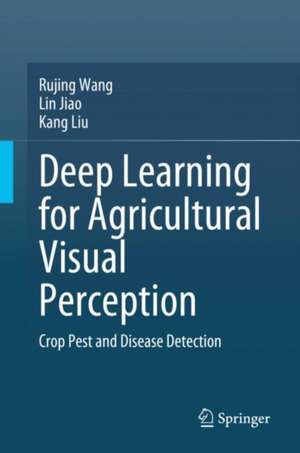Deep Learning for Agricultural Visual Perception: Crop Pest and Disease Detection
Autor Rujing Wang, Lin Jiao, Kang Liuen Limba Engleză Hardback – 21 sep 2023
Preț: 1042.61 lei
Preț vechi: 1303.26 lei
-20% Nou
Puncte Express: 1564
Preț estimativ în valută:
199.52€ • 207.13$ • 166.37£
199.52€ • 207.13$ • 166.37£
Carte tipărită la comandă
Livrare economică 22 martie-05 aprilie
Preluare comenzi: 021 569.72.76
Specificații
ISBN-13: 9789819949724
ISBN-10: 9819949726
Pagini: 131
Ilustrații: XII, 131 p. 1 illus.
Dimensiuni: 155 x 235 mm
Greutate: 0.38 kg
Ediția:1st ed. 2023
Editura: Springer Nature Singapore
Colecția Springer
Locul publicării:Singapore, Singapore
ISBN-10: 9819949726
Pagini: 131
Ilustrații: XII, 131 p. 1 illus.
Dimensiuni: 155 x 235 mm
Greutate: 0.38 kg
Ediția:1st ed. 2023
Editura: Springer Nature Singapore
Colecția Springer
Locul publicării:Singapore, Singapore
Cuprins
Chapter 1. Introduction.- Chapter 2. Deep Learning Technology.- Chapter 3. Large-Scale Agricultural Pest and Disease Datasets.- Chapter 4. Sampling-balanced Region Proposal Network for Pest Detection.- Chapter 5. Crop Pest Detection Methods in Field.- Chapter 6. A CNN-based Arbitrary-oriented Wheat Disease Detection Method.
Notă biografică
Rujing Wang is Professor of Hefei Institute of Material Science, Chinese Academy of Sciences; Chief Engineer of Hefei Institute of Intelligent Machinery, Chinese Academy of Sciences; Professor and Doctoral Supervisor of University of Science and Technology of China; Director of the Smart Agriculture Professional Committee of the National Association of Automation; Director of the Anhui Provincial Technical Innovation Center for Agricultural Sensors and Intelligent Sensing; Director of the Anhui Provincial Key Laboratory for Bionic Sensing and Advanced Robotics Technology; Director of the Anhui Provincial Intelligent Agriculture Engineering Laboratory; and Deputy Editor in Chief of the Journal of Pattern Recognition and Artificial Intelligence. He has published over 200 academic papers and 1 academic monograph, obtained over 100 national invention patents and over 80 national software copyrights, and won one second prize of the National Science and Technology Progress Award and two first prizes of the Anhui Province Science and Technology Progress Award.
Lin Jiao received the PhD degree in computer science and technology from the University of Science and Technology of China, Hefei, China, in 2021. She was an Honoree of Excellent Award of President of Chinese Academy of Sciences, in 2020. She is currently a lecturer at the School of Internet, Anhui University, Hefei, China. She has published over 20 papers and served as a reviewer for more than 10 journals/conferences. Her research interests include machine learning, deep learning, pattern recognition, computer vision, and agricultural informatization.
Kang Liu received his BE degree in automation from Donghua University, Shanghai, China, in 2017, and PhD degree in control science and engineering from the University of Science and Technology of China, Hefei, China, in 2022. He was an Honoree of Excellent Award of President of Chinese Academy of Sciences, China, in 2022 and Outstanding Graduates of Anhui Province, in 2022. He is currently a postdoctoral researcher with the Department of Computer Science, University of Sheffield, Sheffield, United Kingdom. He has published over 15 papers and served as a reviewer for more than 20 journals/conferences. His research interests include theoretical research and engineering applications in intelligence control algorithms and precision agriculture systems.
Lin Jiao received the PhD degree in computer science and technology from the University of Science and Technology of China, Hefei, China, in 2021. She was an Honoree of Excellent Award of President of Chinese Academy of Sciences, in 2020. She is currently a lecturer at the School of Internet, Anhui University, Hefei, China. She has published over 20 papers and served as a reviewer for more than 10 journals/conferences. Her research interests include machine learning, deep learning, pattern recognition, computer vision, and agricultural informatization.
Kang Liu received his BE degree in automation from Donghua University, Shanghai, China, in 2017, and PhD degree in control science and engineering from the University of Science and Technology of China, Hefei, China, in 2022. He was an Honoree of Excellent Award of President of Chinese Academy of Sciences, China, in 2022 and Outstanding Graduates of Anhui Province, in 2022. He is currently a postdoctoral researcher with the Department of Computer Science, University of Sheffield, Sheffield, United Kingdom. He has published over 15 papers and served as a reviewer for more than 20 journals/conferences. His research interests include theoretical research and engineering applications in intelligence control algorithms and precision agriculture systems.
Textul de pe ultima copertă
This monograph provides a detailed and systematic introduction to the application of deep learning technology in the intelligent monitoring of crop diseases and pests. Taking 24 types of crop pests, wheat aphids, and wheat diseases with complex backgrounds as examples, a large-scale crop pest and disease dataset was constructed to provide necessary data support for the deep learning module. Various schemes for identifying and detecting large-scale crop diseases and pests based on deep convolutional neural network technology have also been proposed. This book can be used as a reference for teachers and students majoring in agriculture, computer science, artificial intelligence, intelligent science and technology, and other related fields in higher education institutions. It can also be used as a reference book for researchers in fields such as image processing technology, intelligent manufacturing, and high-tech applications.
Caracteristici
Combines a wide range of deep-learning-based modules for multi-classes pest and disease recognition Covers multiple categories and large-scale of agricultural pests and diseases Integrates the artificial intelligence with agricultural technology
